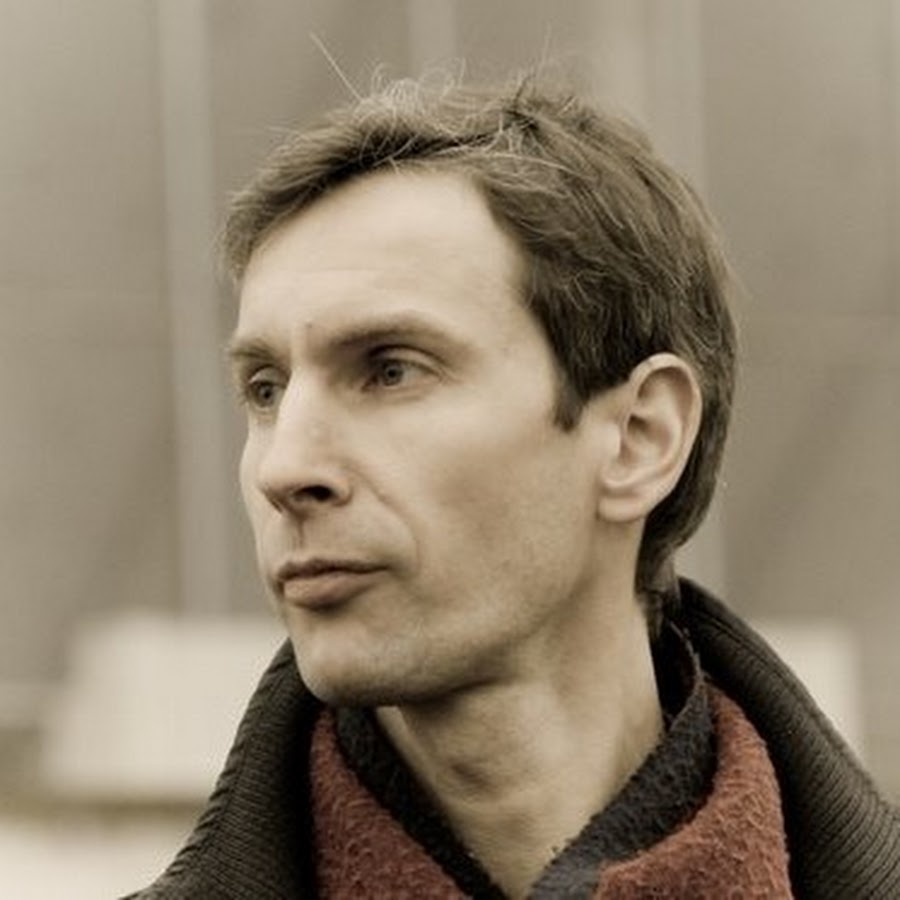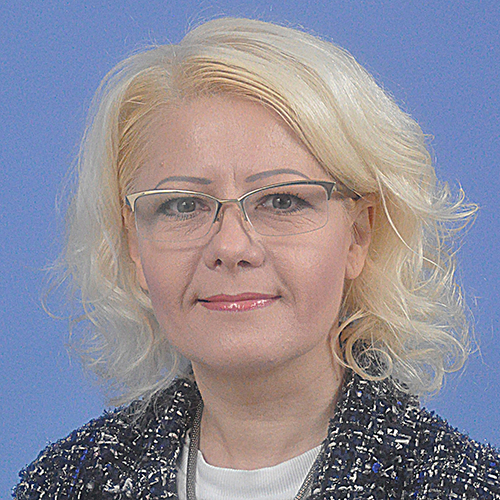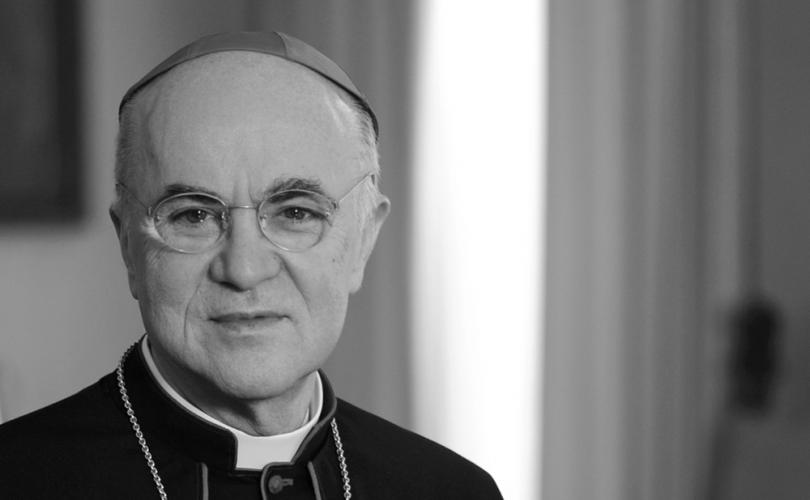'These three elements – heresy, sodomy, and corruption – are so recurrent that they are almost a trademark of the deep state and of the deep church'
uly 25, 2020 (LifeSiteNews) – Archbishop Carlo Maria Viganò has pointed out three elements that have become what he calls the trademark of the deep Church: “heresy, sodomy, and corruption.”
In a new wide-ranging interview with Vatican expert Marco Tosatti (read full interview below), the Vatican whistleblower speaks about the deeper significance of the case of former Cardinal McCarrick in relation to the “doctrinal crisis” the Church is facing.
“There is a very strict relationship between the doctrinal crisis of the Church and the immorality of the clergy, that scandalously reaches up to the highest levels of the hierarchy. But it is also apparent that this crisis is being used by the ultra-progressive wing not only to impose a false morality together with a false doctrine, but also to irremediably discredit the Holy Church and the Papacy before the faithful and the world, through the action of its own leaders,” stated the Archbishop.
Viganò says that a “gay lobby” has “infiltrated into the Church and that is literally terrified that good pastors will shed light on the influence that it exercises in the Secretariat of State, in the Congregations of the Roman Curia, in the Dioceses, and over the entire Church.”
“Bergoglio has surrounded himself with compromised and thus blackmailed personalities, whom he has no qualms about getting rid of as soon as they risk compromising him in his media image,” he said.
Viganò said that “these three elements – heresy, sodomy, and corruption – are so recurrent that they are almost a trademark of the deep state and of the deep church.”
***
Marco Tosatti’s introduction: The commitment of Archbishop Carlo Maria Viganò, the former Apostolic Nuncio to the United States of America, to denounce the veil of silence and cover-ups in the management of abuse cases by members of the clergy, is well known. The spicy and annoyed response by the Vatican authorities – and in particular of various prelates – to the well-argued refutations of the combative prelate is also well known. In this interview, we investigate with His Excellency the developments in the case of former Cardinal McCarrick, also in light of a recent article at Church Militant entitled The McCarrick Bombshell. (1)
But before we get into the content of this article, let’s make a brief review. From February 21 to 24, 2019, a meeting was held in Rome of all of the Presidents of the Bishops’ Conferences on the topic of The Protection of Minors in the Church. (2) A few days earlier, on February 16, 2019, the Congregation for the Doctrine of the Faith announced the dismissal from the clerical state of Theodore McCarrick, who was accused of other serious crimes, and added: “The Holy Father has recognized the definitive nature of this decision made in accord with law, rendering it a res iudicata (i.e., admitting of no further recourse).” (3)
Interview
Marco Tosatti: Your Excellency, can you tell us what the news is on the McCarrick case?
Abp. C.M. Viganò: I fear that there is no news, and this is precisely the news. With the reduction of McCarrick to the lay state, it was hoped to put an end to an age-old affair that came to light with my testimony only in 2018, but everything possible has been done so that the details and results of the process did not emerge. The deception perpetrated through the strategy of proceeding administratively rather than judicially, as well as the decision of Bergoglio to authoritatively confirm the sentence [so that there was no further recourse], prevented not only McCarrick’s objective crimes from coming to light, but also the responsibility of those who for years contributed to hiding the nature and extent of the crimes he committed, protecting his accomplices and those who, with their silence, have covered up his crimes. In this way the conviction of the culprit did not clarify the obscure details. As a simple layman, Mr. McCarrick now enjoys a total freedom of movement and action, and he is still capable of intervening at every level: on the ecclesial level – even with those who covered up for him and supported him, in the Vatican and elsewhere; on the political, social and financial level, by means of the people who remained in contact with him and who received favors from him. The reduction to the lay state does not constitute in any way a medicinal punishment (this is only the necessary premise, because of the proven indignity of the offender), it does not include any form of reparative penance, nor does it render justice to the victims, but rather it grants to Mr. McCarrick the ability to continue undisturbed in his criminal activity, including sexual predation.
The administrative procedure also prevented the victims from being heard, while the testimonies gathered only recently by the lawyer Jeffrey Lena, the legal representative of the Holy See, seem to have been written under dictation: those who have suffered harassment give excuses for the delay in the publication of the Report, attributing it to the large volume of testimonies, (4) with indulgent and justifying tones that are difficult to reconcile with the extreme gravity of the crimes contested by the accused. (5) It seems that some victims, protected by a pseudonym, have lent themselves to an operation aimed at lightening the responsibility of the Holy See and validating the narrative that it maintains before public opinion. There is also the suspicion that these anonymous testimonies are pure fiction. In any case, this is a deception that must be denounced forcefully, because if the corruption of an individual prelate is a scandal, the guilty silence of the one who represents the Church is even more so. If these episodes had been verified under the Pontificate of Benedict XVI, they would have unleashed the fury of the media: their demure attitude of understanding towards Jorge Mario reveals the complicit attitude of mainstream information.
Marco Tosatti: The convocation of the summit at the Vatican was announced as the occasion of giving a firm and determined response to the clergy sexual scandals. In his introductory address, Pope Francis had declared: “In this meeting, we sense the weight of the pastoral and ecclesial responsibility that obliges us to discuss together, in a synodal, frank and in-depth manner, how to confront this evil afflicting the Church and humanity. The holy People of God looks to us, and expects from us not simple and predictable condemnations, but concrete and effective measures to be undertaken. We need to be concrete.” (6)
Abp. Viganò: The solemn proclamations which preceded, accompanied, and followed this meeting absolutely did not lead to any concrete practical action, as was hoped for. (7) Just as during the meeting no answer was given to the legitimate and insistent demands made by journalists to Bergoglio on August 26, 2018, after my denunciation. (8)
With regard to the content of the interventions at the summit, it seems that even the clergy sexual scandals, instead of toughening the penalties and making the interventions more incisive, have only led to almost obsessive repetition about the new “synodal” aspect of the Church, which corresponds to a precise intention to change her constitution in a democratic key. The Archbishop of Chicago Blase Cupich – a friend of Theodore McCarrick and the president of the Vatican summit – focused his own intervention at the summit on “synodality” as a necessary passage of “structural, legal and institutional reform” (9) of action only nominally intended to stem abuse.
Marco Tosatti: In what way can “synodality” help the bishops to resolve the problem of clergy abuse?
Abp. Viganò: The proposal to establish a commission of independent lay persons who would have overseen the work of the bishops, formulated during the plenary assembly of the United States Conference of Catholic Bishops in November 2018, was blocked by Cardinal Marc Ouellet, Prefect of the Congregation for Bishops. (10) This intervention by the Vatican disavowed the proclamations of “synodality” as soon as the decisions of the Bishops’ Conferences did not coincide with what Rome wanted. However, I consider His Eminence Cardinal Ouellet to have been merely the executor of maneuvers that were imposed on him from higher up.
Marco Tosatti: Isn’t it a good thing that the Vatican is keeping decisions that involve doctrinal and moral questions to itself?
Abp. Viganò: The authority of the Roman Pontiff, which expresses itself also through the Roman Congregations, cannot obviously be delegated to merely consultative organs that do not have any jurisdiction and that are not a part of the hierarchical structure of the Church as Christ instituted it: on this point we need to be clear. However, it is significant that the “synodal path” hoped for by the highest authorities in Rome does not encounter any obstacle, except for the moments in which it risks becoming embarrassing in the media, as in the case of a special commission appointed to receive denunciations against the bishops.
This call for “synodality” is a theme that is dear to the progressive theological current that wants to strip away the hierarchical structure of the Church. In this regard, the recent articles of Massimo Fagggioli are very clarifying. He is a professor at Villanova University, where on October 11, 2013 then-Cardinal McCarrick affirmed that he had supported the election of Cardinal Bergoglio during the General Congregations prior to the Conclave that had been held just a few months earlier, and that he had spoken with “a very influential Italian gentleman” (11) who had confided to him that within the span of five years the new pope would reform the Church.
It ought to arouse alarm that the same school today is giving disturbing signs of dissatisfaction with the work of Bergoglio, whose pontificate is defined as being “in crisis” by “deluded people” (12) – perhaps because the five years that McCarrick alluded to have not yielded the results they hoped for.
Marco Tosatti: In the address Cardinal Reinhard Marx gave about the Vatican summit, he said: “Proper legal proceedings serve to establish the truth, and form the basis for imposing a punishment which is appropriate for the relevant offence. People in the Church also need to see how this judge comes to the sentence and what the sentence is; nearly all are secret, we cannot see this. I think that in our situation it is not good. In addition, they establish trust in the organization and its leadership. Lingering doubts about the proper conduct of court proceedings only harm the reputation and the functioning of an institution. This principle also applies to the Church.” (13)
Abp. Viganò: The publication of the procedural acts should be one of the cornerstones of the operation of transparency and honesty towards the victims of abuse by members of the clergy. It appears evident to me that the words of Cardinal Marx have been disregarded, beginning with the McCarrick case, precisely through Bergoglio’s initiative.
I further recall that Cardinal Daniel DiNardo, the President of the United States Bishops’ Conference, was disavowed with little regard by the Vatican intervention, which replaced him at the meeting in Rome the following February with Cardinals Blase Cupich and Joseph William Tobin, who are also not exempt from suspicions on their own account. These interferences, clearly desired from on high, have created a media image that does not correspond to reality, in which Bergoglio is presented as the architect of a non-existent reform, for mere propaganda purposes. Even the request made by Francis for the resignation of the entire Chilean Episcopate is part of a facade operation that is clearly denied by the facts.
I think that the two-fold measure reserved for the American and French Bishops’ Conferences is emblematic: on the U.S. side, Bergoglian interventionism prevented an operation of transparency by authority; while on the French side, it allowed clear violations of canon and civil law, permitting the investigations of the ecclesiastical forum to be entrusted to a Masonic judge who is also in favor of euthanasia. The Jacobin spirit in pursuing French clerics accused of child molestation fails however to recognize the responsibility of the Ordinaries and religious Superiors, who are guilty of those same cover-ups that are consolidating in practice also in Rome.
Marco Tosatti: And yet we have also heard the Pontiff recall, in his final address, the words he had already spoken to the Roman Curia in 2018: “The Church will never try to cover up or underestimate any case.”
Abp. Viganò: This solemn affirmation is disavowed by the most emblematic case, the very case of Theodore McCarrick, and makes us think that other interests may have led to the decision to liquidate the matter through the administrative path, and, even more gravely, without the publication of the judicial acts.
Marco Tosatti: What are those other interests, in your opinion?
Abp. Viganò: They want to focus attention on the abuse of minors, moving it away from the clear and dutiful condemnation of the homosexual behaviors which are often the cause of these abuses. For Bergoglio and his entourage sodomy is not a sin that cries out for vengeance in the presence of God, as the Catechism teaches. Bergoglio’s words on this topic – and even more the actions and words of those who surround him – unfortunately confirm that an operation of legitimization of homosexuality is currently underway, and that prelates and theologians are carrying this discussion forward who have manifested without equivocation that they are unfaithful to Catholic teaching.
Cardinal Tobin himself – whose embarrassing messages on his cell phone speak for themselves (14) – has clearly stated that he does not agree with the condemnation of sodomy present in the Catechism, refusing to define homosexual acts as “intrinsically disordered.” (15) And these statements follow Cardinal Tobin’s support for the book Building a Bridge by Father James Martin, S.J., that has the same content. Thus we find a cardinal who is a friend of McCarrick lined up in favor of the LGBT movements and the Jesuit whom Bergoglio appointed as a Consultor of the Secretariat for Communications of the Holy See, even inviting him to speak at the World Encounter of Families in Dublin in 2018 and receiving him in audience. (16)
Cardinal Cupich has expressed himself many times in favor of homosexuals, and during the Synod on Youth – to which he was sent to participate by direct appointment of the Pope without having been elected to represent the American bishops – the controversial theme of homosexual relations was inserted into the Instrumentum Laboris even though no group of young people had requested it. I recall, en passant, that Cupich was imposed on the See of Chicago by Bergoglio, against the opinion of the Nunciature.
The interests are therefore clearly those of the “gay lobby” that has infiltrated into the Church and that is literally terrified that good pastors will shed light on the influence that it exercises in the Secretariat of State, in the Congregations of the Roman Curia, in the Dioceses, and over the entire Church. The obscene, even sacrilegious homoerotic fresco that Archbishop Paglia commissioned for the cathedral of Terni (17) is an arrogant ideological manifesto that no Authority has ever censured or deplored; the excessive financial affairs of the Substitute of the Secretariat of State Archbishop Edgar Peña Parra (18) – tied to Cardinal Maradiaga (involved in the scandal of homosexual abuse by his auxiliary bishop, Juan José Pineda, without there being news of any ecclesiastical initiative against him) – and the very grave accusations de Sexto that weigh on him (19) and that I have amply denounced, (20) have not in any way interrupted his cursus honorum in the Vatican; the same holds for Bishop Gustavo Óscar Zanchetta, (21) whom Bergoglio has promoted and, while a criminal trial is still pending, has recently reappointed as Assessor of the Administration of the Patrimony of the Apostolic See. (22) After the order to bring all the current accounts of the dioceses and religious congregations of the world to APSA, Zanchetta finds himself managing the finances of the Church (being able to boast in his own curriculum of having the authoritative diploma of an electrician) and being at the same time easily the object of internal and external blackmail. (23) And let’s not forget the work of Archbishop Ilson de Jesus Montanari, Secretary of the Congregation of Bishops, Secretary of the Sacred College and vice-Camerlengo of the Holy Roman Church, in the name of and on behalf of those who elevated him to the highest ranks of the Roman Curia as a reward for his fidelity.
I believe it is essential to clarify once and for all the close link between sodomy and pedophilia, which is also confirmed by the statistics themselves: a link that the Vatican summit scrupulously kept silent about in order not to offend the current mentality that is widespread even among many prelates. But it would be hypocritical and culpable to condemn pedophilia in the wake of current civil legislation without equally condemning sodomy, which today’s aligned thought does not consider to be criminally relevant but which the Church identifies among the sins that cry out for vengeance in the presence of God.
But there is also another interest, of a political nature, that should not be underestimated...
Marco Tosatti: What are you referring to?
Abp. Viganò: I am speaking of the political role of McCarrick, which the latest article by Church Militant also mentions: “It was McCarrick who worked out the Vatican-China accord, a mission given to him personally by Pope Francis. Francis unshackled him from Benedict-imposed restrictions just weeks after becoming pope — a fact confirmed by Abp. Viganò. Likewise, sources in China […] show that McCarrick may have been instrumental in working out the ongoing secret payments of billions of dollars from the Chinese communists to Francis’ Vatican. If that's true (and it looks plausible given McCarrick’s communist ties and friendliness with Beijing) that could go a long way in explaining why the report remains sitting on the pope's desk, unpublished.”
Just in the last few days the news has been divulged on Christian Today according to which “China has ordered Christian villagers to renounce their faith and worship the nation’s Communist Party leaders instead.” (24) In the face of this persecution of Christians – and of those Catholics faithful to the Holy See – by the communist dictatorship, the silence of Santa Marta is literally deafening, as it was a few days ago when at his Angelus message Bergoglio omitted the appeal on behalf of Hong Kong that had been given to the press. (25) The secret agreement made between the Holy See and Beijing that has been denounced publicly by Cardinal Zen, demonstrates the subjection of the Bergoglian church to the diktats of the communist dictatorship, handing over the local Hierarchy into the hands of its persecutors and keeping silent on the human rights violations perpetrated by the regime.
I recall that in the spring of 2014 I wrote to the Secretary of State Cardinal Parolin, asking him if the provisions taken by Benedict XVI towards McCarrick were still valid or not, following an article that appeared in the Washington Times which reported about his trip to the Central African Republic on behalf of the U.S. Department of State. (26) Cardinal Parolin never responded, but the news that is coming out in recent days seems to clarify these aspects too. The freedom of movement given to McCarrick was also known, (27) and he himself wrote in 2012: “I was in Doha last week and go to Ireland… and following that… I begin one of my longest trips – Beirut, Jordan, Egypt, Thailand, Myanmar, Cambodia and Hong Kong… before I start again in the Holy Land and Belarus.” (28) And in 2014: “I leave for China on Thursday the 27th… I am sure that [Secretary of State] Cardinal Parolin would see me since he is involved with my China trip.” (29)
Among other things, the cooperation of the Society of Jesus in the diplomatic moves of the Vatican with the dictatorship of Beijing – beginning with the special Chinese edition of Civiltà Cattolica – confirms the willingness of the Holy See to give an endorsement to China, just as suspicions materialize about its responsibility for the spread of the Covid virus in order to destabilize the international geo-political balance. The role of Antonio Spadaro and other Jesuits – all frequent visitors to Villanova University – is emblematic and demonstrates the red thread that links doctrinal progressivism to moral perversion and political corruption. On the other hand, these three elements – heresy, sodomy, and corruption – are so recurrent that they are almost a trademark of the deep state and of the deep church.
Speaking of the deep state, it is not surprising that the World Health Organization has made itself complicit in this operation of social engineering in order to please China, nor that President Trump has decided to withdraw the funding that has benefited it to date. What surprises and scandalizes is rather the complicit silence of the Vatican, faced with a sort of coup d'état that makes the Bergoglian church the spiritual arm of the World Government, under the aegis of communist tyranny and with the complicity of globalist parties. Italy, with its unelected government and the majority in a most serious political crisis, seems to be following the agenda and does not seem to want to review its positions towards Beijing: the constant threats of a return to the Covid emergency and to a lockdown are clearly instrumental in maintaining a power which in the presence of democratically convened elections would demonstrate its inconsistency. What is certain is that a slightly more incisive and less-aligned opposition to the mainstream narrative could be seen positively by both the electorate and the international partners of Italy.
Marco Tosatti: Let’s return to the question of the clergy scandals. On February 19, 2019, two days before the beginning of the summit presided over by Cardinal Cupich, an Open Letter was published by Cardinals Raymond Burke and Walter Brandmüller to the Presidents of the Bishops’ Conferences: “Before the drift in process, it seems that the difficulty is reduced to that of the abuse of minors…which is, however, only part of a much greater crisis…. Sexual abuse is blamed on clericalism. But the first and primary fault of the clergy does not rest in the abuse of power but in having gone away from the truth of the Gospel… In the face of this situation, Cardinals and Bishops are silent. Will you also be silent?... Today, [our] dubia have not only not had any response [from the Holy Father] but are part of a more general crisis of the Faith. Therefore, we encourage you to raise your voice to safeguard and proclaim the integrity of the doctrine of the Church.” (30) What result came from this appeal of the eminent Prelates?
Abp. C.M. Viganò: Cardinals Burke and Brandmüller, like other Prelates, have done nothing but laudably reaffirm Catholic doctrine: the unheard of thing is that they are the ones who are considered “strange” in the ecclesial structure, while a voice is given to those personalities who for their acquaintances, their endorsements of the LGBT agenda, and in some cases even for the shadows that hang over their conduct ought to be removed from the Church and severely censured.
In April 2019, Benedict XVI published a strong intervention in Klerusblatt, which was then reprinted in Italy by Corriere della Sera (31) and was fiercely censored by Marco Politi at Il Fatto Quotidiano. (32) This article was in reality intended for the summit in Rome through the Secretariat of State, but it was boycotted, confirming the intervention of the “lavender mafia” to impede the Holy Father from making his position on the subject known to the Bishops.
Marco Tosatti: Can you remind us of what this intervention of Benedict XVI consisted of?
Abp. Viganò: The focal point of the article of Ratzinger that infuriated the supporters of Bergoglio was precisely that it pointed out the connection between homosexuality and pedophilia and also between the relaxing of morality following the Council and the spreading of the plague of abuse.
Obstinately closing his eyes in the face of the evidence, the progressive Marco Politi wrote: “What does the abandonment by the Church of an ethic based on natural law have to do with pedophilia? What do changes in Catholic moral theology have to do with it, what do gay cliques in seminaries have to do with it, what do porn films have to do with it, what does the relativization of values and moral judgment have to do with it?” (33) And yet it is evident that where the formation of candidates for the priesthood and religious life cancel discipline and the interior life, vices and sins multiply that degenerate even into the most grave crimes against minors, and not only that.
The cause of this change resides precisely in the “spirit of the Council,” which Benedict XVI wanted only to mention but which did not fail to be immediately grasped by those who saw the superdogma that was being questioned: “Truly grotesque [sic] is the attempt by the ex-pontiff to attach to the “conciliar” spirit the position of extreme guarantism of ecclesiastical processes, aimed at the protection of the accused to the bitter end “to the point of practically excluding the condemnation of the guilty,” the essay says. Thus would it be the fault of the advocates of the Council, said more plainly the fault of the reformers, if the network of cover-up artists and pettifoggers, which in any case tried and still tries to impede the trial and condemnation of clerical predators, was revealed to have always been so overbearing and powerful?” (34)
Marco Tosatti: Do you think that Marco Politi is right?
Abp. Viganò: I believe that the answer to this rhetorical question of the vaticanist Politi can be indisputably affirmative: there is a very strict relationship between the doctrinal crisis of the Church and the immorality of the clergy, that scandalously reaches up to the highest levels of the hierarchy. But it is also apparent that this crisis is being used by the ultra-progressive wing not only to impose a false morality together with a false doctrine, but also to irremediably discredit the Holy Church and the Papacy before the faithful and the world, through the action of its own leaders.
Marco Tosatti: Don’t you think that in the end the Report that everyone is waiting for will be published?
Abp. Viganò: If it is possible to shed light on this affair, this will happen despite the Vatican: the interests at stake are enormous and directly affect the very top of the Church, and not only for questions of a doctrinal, moral, or canonical nature, but also for political and diplomatic aspects that have seen the Holy See become the object of a coup d'état with the complicity of those who should have defended it in its sovereignty and independence. What did not succeed during the pontificate of Benedict XVI was brought to fruition after his resignation. How can we hope that the one who is indebted for his own election to McCarrick – who was one of the main proponents of the secret agreement with China – will be able to clarify a series of events that involve him personally, demonstrating the connivances with the Chinese dictatorship against Catholics faithful to the Holy See and perhaps also the responsibility of that regime for the resignation of Pope Benedict? How can we imagine that the murky events of Saint Gallen will become clear, when it was there that the conspirators organized the election of Bergoglio? And how can we believe that the Church will purify herself of the corruption and vice of her clerics and prelates, when they are the ones who have taken power and who are promoted to the highest levels in a web of complicity between heretics, perverts, and traitors?
The one who ought to investigate the scandals is heavily involved in the appointment, promotion, and protection of those who are guilty: Bergoglio has surrounded himself with compromised and thus blackmailed personalities, whom he has no qualms about getting rid of as soon as they risk compromising him in his media image.
Let’s not forget that the legitimization of homosexuality is part of the agenda of the New World Order – to which the Bergoglian church adheres openly and unconditionally – not only for its destabilizing value in the social body, but also because sodomy is the principal instrument with which the Enemy intends to destroy the Catholic priesthood, corrupting the souls of the Ministers of God.
For this reason, at least as far as what seems possible, the entire truth about McCarrick will never officially come to light.
Marco Tosatti: How can we respond to this corruption?
Abp. Viganò: Today what cannot be deferred is a joint action of those who are good – those who in my Open Letter to President Trump I defined Biblically as “the sons of Light” – in order to bring to light the complicities and crimes of those who make war on the Good so as to establish the New World Order. In this operation of truth and transparency, the role of the United States may be decisive, above all when those who should and could contribute from the Vatican practice a code of silence. As the Lord said, “I tell you that if they keep silent, the very stones will cry out.” (35)
But there is a more important aspect, of a spiritual nature. We must understand that the ecclesial crisis was caused by having wanted to remove the crown from the Church’s King, Our Lord: He must return to reign not only in our hearts and families but also in civil society and most of all in the Church. Oportet illum regnare. And along with the King of Kings, Our Lady must also reign, the Queen and Mother of the Church, which has culpably disobeyed her by not consecrating Russia to Her Immaculate Heart. This is my most sincere wish, to which I ask all people of good will to unite themselves.














